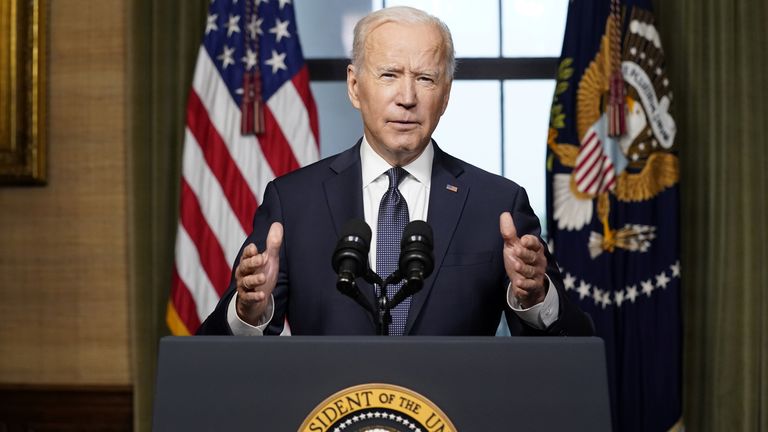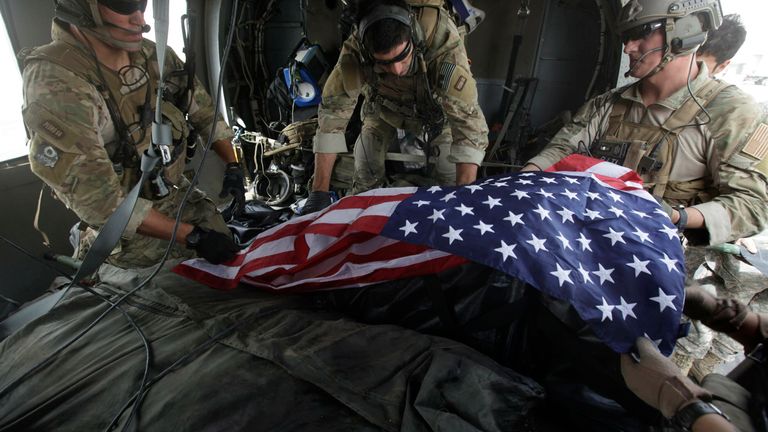The US has begun its final phase of the withdrawal of its own and NATO’s last troops from Afghanistan – with the aim of leaving the country by the end of summer.
It will bring to an end America’s “forever war” in the country, which began with the invasion in response to the 9/11 terror attacks.
About 2,500-3,500 US and about 7,000 NATO soldiers remain.
In recent weeks, the military has been flying out equipment on massive C-17 cargo planes but now it is stepping up the job of deciding what is being shipped back to the US, handed to the Afghan security forces or sold as junk in Afghanistan’s markets.
The Taliban, which has renewed vigour in its battle to regain power in Afghanistan, continues to accuse Washington of breaching the deal it signed with Donald Trump more than a year ago.
In that agreement, the US said it would withdraw completely by 1 May.
With the deadline having passed, Kabul was on edge on Saturday, with a noticeably increased military presence and security at checkpoints.
Security sources said the Afghan capital was on “high alert”.
In a statement on Saturday, Taliban military spokesman Zabihullah Mujahid said the failure of the US to withdraw by the agreed deadline “opened the way for (Islamic Emirate of Afghanistan) mujahidin to take every counteraction it deems appropriate against the occupying forces”.
But he said fighters on the battlefield would not act until their leaders told them to and any decision to do so would be based on “the sovereignty, values and higher interests of the country”.
On Saturday, it was unclear whether that vow was being adhered to.
What a US forces spokesman described as “ineffective indirect fire” at an airfield in Kandahar caused no injuries or damage and the Taliban did not comment on whether it was involved in the incident.
It prompted the commander of foreign forces in Afghanistan General Scott Miller to warn it would be a mistake for insurgents to attack foreign troops.
The violence in Afghanistan has been getting worse since the agreement to withdraw was signed in February 2020.
Talks between the Taliban and Afghan government, which as part of the agreement were supposed to create a lasting peace, quickly got bogged down.
The US is thought to have spent more than $2 trillion in Afghanistan in the past two decades, according to the Costs of War project at Brown University.
It started on 7 October, 2001, with the US and its NATO allies setting out to hunt down the al Qaeda perpetrators of the 9/11 terrorist attacks who lived under the protection of the country’s Taliban rulers.
Two months later, the Taliban had been beaten and Osama bin Laden and his al Qaeda forces had been forced to escape.
When he announced last month that the US withdrawal would go ahead, President Joe Biden said the initial mission was accomplished when bin Laden was killed by US special forces in neighbouring Pakistan 10 years ago.
Since then, al Qaeda has ceased to be the threat it once was perceived to be and Islamic State and other Islamist extremists have spread into a global phenomenon that Mr Biden said is not tackled by keeping a large number of troops in one country.
Some 47,245 civilians have been killed since 2001, according to the Costs of War project. Millions more have been forced to move away from their homes inside Afghanistan or to flee to Pakistan, Iran and Europe.
An estimated 66,000 to 69,000 Afghan troops have been killed, with the US and NATO paying $4bn a year to keep its security forces going.
Some 2,442 US troops, according to the US Department of Defence, and 1,144 personnel from other NATO countries have been killed, including 454 British forces as of 2015.















